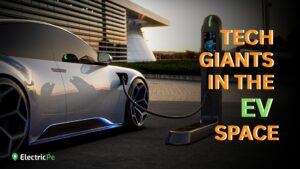Introduction
The introduction of electric vehicles (EVs) has resulted in a notable revolution in India’s corporate fleet industry. The entire world is facing a dire need to mitigate climate change and cut carbon emissions, which is speeding up the transition to sustainable transportation options. This blog explores the growth of electric vehicles (EVs) in India’s corporate fleet market, emphasizing the significance of the problems the corporate market faces and the essential fixes that can help them resolve it.
Did you know? The Indian government has been encouraging the adoption of electric vehicles as part of its attempts to reduce pollution and reliance on fossil fuels. Incentives and regulations were being used to encourage the corporate sector to switch to electric vehicles.
Benefits to the Corporate Fleet Market
- Cost Savings:
- Lower Operating Costs: EVs generally have lower operating costs compared to petrol vehicles. They have fewer moving parts and require less maintenance, so it’s highly beneficial for daily commuters.
- Environmental Sustainability:
- Reduced Carbon Footprint: EVs produce zero tailpipe emissions, helping companies reduce their carbon footprint and meet sustainability goals. This is particularly important for businesses committed to corporate social responsibility and environmental administration.
- Regulatory Compliance:
- Emission Standards: As governments around the world implement stricter emission standards, using electric vehicles can help companies comply with these regulations and avoid potential fines associated with high-emission vehicles.
- Brand Image and Corporate Social Responsibility (CSR):
- Green Image: Adopting EVs for corporate fleets can enhance a company’s brand image by demonstrating a commitment to sustainability and environmental responsibility. This can be particularly appealing to environmentally conscious consumers and investors.
- Employee Satisfaction:
- Employee Attraction and Retention: Offering electric vehicles as part of a corporate fleet can be an attractive perk for employees who value sustainability and want to work for environmentally responsible companies.
- Energy Efficiency:
- Energy Cost Stability: EVs provide companies with the opportunity to manage and stabilize their energy costs, especially if they can leverage renewable energy sources for charging.
- Technological Advancements:
- Innovation and Technology Leadership: Embracing EVs can position a company as an industry leader in adopting cutting-edge technologies, showcasing a commitment to innovation.
- Infrastructure Development:
- Charging Infrastructure: As the charging infrastructure continues to grow, businesses can benefit from increased accessibility to charging stations, making it more convenient to integrate EVs into their fleets.
As the EV industry evolves, there is a worldwide trend toward electric mobility. Market developments, technical advancements, and shifting consumer preferences ultimately affect corporate decisions. As a result, firms are forming partnerships with electric vehicle makers and other participants in the clean energy market in order to drive technology and speed up the adoption of electric vehicles.
While there are clear benefits to adopting EVs in corporate fleets, it’s essential for businesses to assess their specific needs, consider infrastructure requirements, and evaluate the total cost of ownership to make informed decisions about switching to electric vehicles.
While there are clear benefits to adopting EVs in corporate fleets, it’s essential for businesses to assess their specific needs, consider infrastructure requirements, and evaluate the total cost of ownership to make informed decisions about switching to electric vehicles.
Challenges and Solutions
By addressing these challenges proactively, organizations can enjoy the smooth transition to electric vehicles in their corporate fleets and dwell in the long-term benefits of cost-effective transportation.
CHALLENGES
SOLUTIONS
Limited Range and Charging Infrastructure
EVs may have limited driving range compared to petrol vehicles, and a lack of charging infrastructure can make it challenging for fleet managers to plan routes effectively.
Invest in vehicles with longer ranges, strategically plan charging infrastructure installations, and leverage existing public charging networks. Consider workplace charging stations to support daily charging needs.
Upfront Cost
The initial cost of purchasing electric vehicles can be higher than that of petrol vehicles, and this may be a barrier for some organizations.
Explore government incentives, tax credits, and subsidies available for electric vehicle adoption.
Vehicle Availability and model options
The limited availability and variety of electric vehicle models in certain vehicle classes may limit choices for fleet managers.
Stay updated on new EV models entering the market. Engage with automakers to express fleet-specific needs and preferences.
Employee training and awareness
Employees may need training to operate and maintain electric vehicles, and there may be a lack of awareness about the benefits and features of EVs.
Provide comprehensive training programs for drivers, maintenance staff, and fleet managers. Develop awareness campaigns to highlight the advantages of EVs and address any misconceptions.
Resale Value
Uncertainty about the resale value of electric vehicles may be a concern for fleet managers.
Stay informed about the evolving electric vehicle market and resale trends. Consider longer lease periods to minimize the impact of potential resale value fluctuations.
Conclusion
The corporate sector’s embrace of EVs aligns with broader global efforts to reduce carbon emissions and combat climate change. The positive impact on corporate social responsibility, coupled with the potential for enhanced brand reputation, further motivates companies to integrate electric vehicles into their fleets.
The rise of EVs in the corporate fleet market reflects a paradigm shift towards cleaner transportation solutions, reflecting a green environmental and corporate change.





